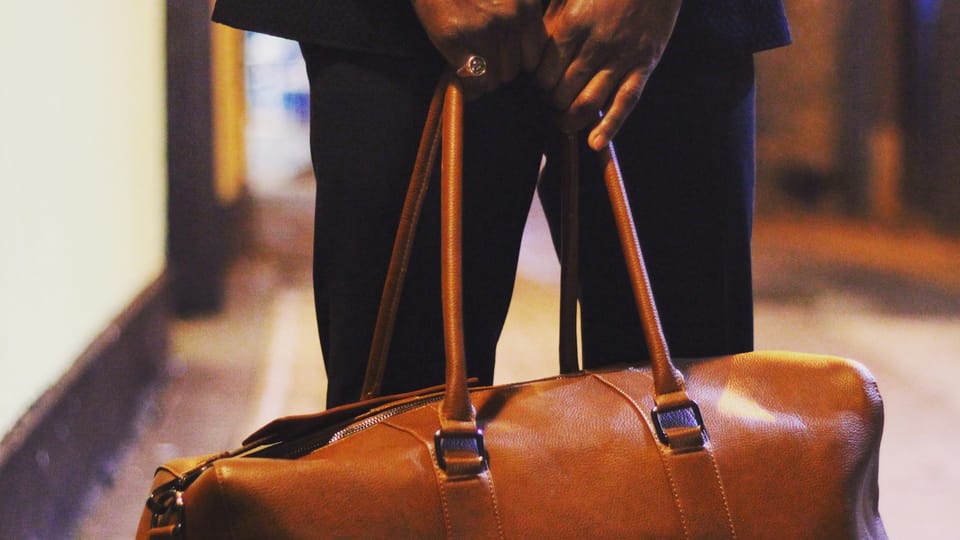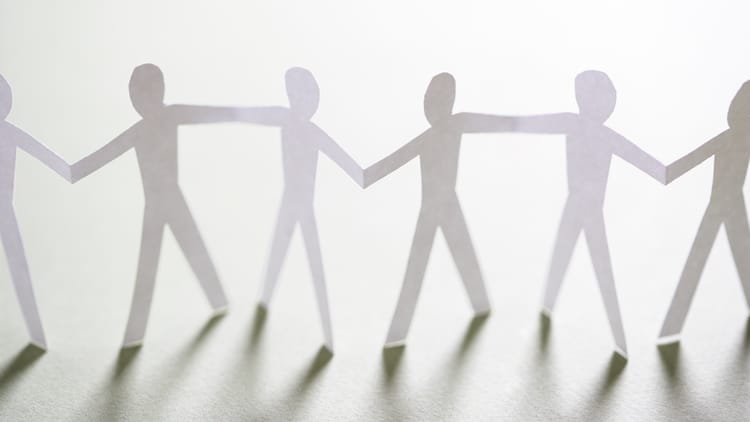Baggage (Colossians 3:1-17)

In November 2001, over a hundred people attended a meeting in the gym upstairs. The purpose of the meeting was to look back on the history of the church and. with God’s help, to chart a path for us to take in the future.
For part of the day, we put together a timeline of the church’s history. We were given pieces of paper – yellow pieces, representing good or neutral events; pink pieces to represent painful events, and blue pieces, representing external events that affected the church. I wish I had pictures of the gym wall as it was covered with these slips of paper, but I do have the notes that were taken from the timeline.
I know you can’t read what’s on all of the notes. Do you notice something, though, as you look at the timeline? There are a lot of pink or painful events. We have been around long enough as a church to have accumulated experiences that have been painful for us as a church. Our story as a church, up until this point, is incomplete unless we say that it is a story that has involved some pain.
I hadn’t thought of this for a while until late last year I had dinner with one of our leaders. He mentioned the pink or painful events in our history and wisely said that we probably shouldn’t have moved on in the planning process before we had dealt with these painful events in the history. The issue isn’t that our story involves pain; everyone’s story involves pain. The issue is if we have painful issues in our past as a church that are left unresolved. Each of these pink events has the potential to push us closer to God, but each of these pink events also has the potential to linger as unresolved issues or baggage that we carry around with us even today.
We need, we long for, community as a church. I don’t think there’s a person here who would argue with the fact that we’ve been called to love each other. We know that it’s commanded by Jesus. We are to love each other, and Jesus has set the standard of how much: just as he loved us, so we are to love each other. You don’t get a higher standard than this. All of us would likely nod our assent to Paul’s words, that if we don’t have love we are nothing. I don’t think there’s a person here who doesn’t agree that we are called to love each other, or who doesn’t long for this type of community for us as a church.
The issue, or at least one of them, is that although we want and need true community, we have baggage. We have been hurt. When we hurt we turn toward self-protection. We struggle to forgive those who have hurt us, and we no longer feel safe.
You may be here this morning and this doesn’t apply to you. You don’t have any baggage, at least not related to the church body. But for some of us, this is very real. If we were honest with ourselves today, we’d have to admit that we have been carrying around baggage for years related to how someone or something hurt you. This baggage may be new or it may be old. The wounds may be fresh or they may be almost healed. But I’d ask you to take a minute to identify the baggage you think you may be carrying this morning. We’re not going to lay blame or tell you that you shouldn’t be carrying this baggage. The hurts are real. But I would ask you to identify what baggage from the past, if any, that you are carrying today. So let’s do that for a minute.
[Pause]
Now the question is, what are we going to do with this stuff? Does anyone here deny that we have baggage? Does anyone deny that this baggage gets in the way of keeping Christ’s command to love each other as he has loved us? Of course it gets in the way. One of the ongoing issues that we will face is that until we deal with the baggage and hurts from the past, we will never experience the oneness that Christ prayed for. We will never be able to experience the authentic community that lets the world know that we are Christ’s disciples.
If you have tried to deal with the baggage yourself, though, you know it’s impossible. The reality is that some of our baggage looks like this: it’s chained to our wrists. We would like to get rid of it but we can’t. We don’t have the power. We’re cursed to carry it with us until someone else comes and unlocks the key that keeps it shackled to us.
I’m going to suggest this morning that getting rid of our baggage is absolutely essential. My friend was right – we can’t move on as a church until we deal with this stuff that’s accumulated. I’m also going to suggest that there’s a way that we can get rid of the baggage, but it won’t be through dealing with the problem ourselves. You can drop the luggage but it will be dragging behind you until the handcuff is unlocked, and you can’t do that for yourself. But there is a way for us to experience the freedom of dropping our baggage. There is a way to be unchained and to experience true freedom and to begin to move toward true community. Today I want to describe what that is, and then invite you to begin the process yourself.
Scythians Among Us
Please turn in your Bibles to Colossians 3. We’re going to read verses 5 to 15:
Put to death, therefore, whatever belongs to your earthly nature: sexual immorality, impurity, lust, evil desires and greed, which is idolatry. Because of these, the wrath of God is coming. You used to walk in these ways, in the life you once lived. But now you must also rid yourselves of all such things as these: anger, rage, malice, slander, and filthy language from your lips. Do not lie to each other, since you have taken off your old self with its practices, and have put on the new self, which is being renewed in knowledge in the image of its Creator. Here there is no Gentile or Jew, circumcised or uncircumcised, barbarian, Scythian, slave or free, but Christ is all, and is in all.
Therefore, as God’s chosen people, holy and dearly loved, clothe yourselves with compassion, kindness, humility, gentleness and patience. Bear with each other and forgive one another if any of you has a grievance against someone. Forgive as the Lord forgave you. And over all these virtues put on love, which binds them all together in perfect unity.
Let the peace of Christ rule in your hearts, since as members of one body you were called to peace. And be thankful.
I want to zero in on one group of people that Paul mentions in verse 11: Scythians. Most of the time we read over this and get the general idea without necessarily understanding exactly who the Scythians are.
I had a teacher explain to me a little about the Scythians once. It was almost twenty years ago, but I’ve never forgotten. I’m going to read you the quote that he gave us. It’s from the historian Herodotus, who is lived in the 5th century BC and is called the father of history. Here’s how he describes the Scythians:
In what concerns war, their customs are the following. The Scythian soldier drinks the blood of the first man he overthrows in battle. Whatever number he slays, he cuts off all their heads, and carries them to the king… [the passage then describes how the Scythian soldier scalps his victim and how he uses the scalp as a napkin or cloak]
The skulls of their enemies, not indeed of all, but of those whom they most detest, they treat as follows. Having sawn off the portion below the eyebrows, and cleaned out the inside, they cover the outside with leather. When a man is poor, this is all that he does; but if he is rich, he also lines the inside with gold: in either case the skull is used as a drinking-cup. They do the same with the skulls of their own kith and kin if they have been at feud with them, and have vanquished them in the presence of the king. When strangers whom they deem of any account come to visit them, these skulls are handed round, and the host tells how that these were his relations who made war upon him, and how that he got the better of them; all this being looked upon as proof of bravery.
So you get the idea of who these Scythians were. The soldiers scalped victims and used the scalps for napkins and clothes. And if you went to his house you may have a skull of one of his relatives passed around and hear how he won the family fight.
By the time that Paul wrote these words, hundreds of years had passed, but the view of Scythians had not really changed. Scythian was a word that people used for the savage and uncivilized. Scythians were known for their brutality and were considered as little better than wild beasts. They were generally considered the most barbaric, cruel and anti-Greek people.
Now read verses 11 to 14 again in light of this:
Here there is no Gentile or Jew, circumcised or uncircumcised, barbarian, Scythian, slave or free, but Christ is all, and is in all.
Therefore, as God’s chosen people, holy and dearly loved, clothe yourselves with compassion, kindness, humility, gentleness and patience. Bear with each other and forgive one another if any of you has a grievance against someone. Forgive as the Lord forgave you. And over all these virtues put on love, which binds them all together in perfect unity.
Now, either Paul is making something up, or else there is something at work within the church that can take a Scythian and put him within a church and say that all the divisions and all the baggage that separate a Scythian from the rest of us are gone. Paul says that in Christ, the differences have been obliterated.
Is there baggage when you are in authentic community with Scythians? You had better believe it. But Paul says that there is something that can overcome that baggage, so that the church can be full of compassion, kindness, humility, gentleness, patience, and forgiveness that can overcome grudges. There’s something that can bring love.
So what is this? Because I’m sure that if this power has the power to overcome the baggage of Scythians in the church, this same power can liberate us from our baggage and allow us to overcome the baggage from our past. What is it? What has the power to liberate us?
Freedom from our Baggage
Before we look at what it is that can liberate us from our baggage, I want to come back to our situation. Last week I spoke on the one thing that truly matters, and that’s that we love one another. Someone said after the service that they agree that this is the one thing that really matters. They said, though, that they don’t think it can happen here.
I agree. It’s impossible for us to overcome our baggage and to become an authentic community of love, just in the same way that it’s impossible for a community to exist in which there “is no Gentile or Jew, circumcised or uncircumcised, barbarian, Scythian, slave or free.” It’s impossible on a human level, but Paul says it’s not only possible, it’s reality. We don’t have to get to this point. We are already here. We don’t have to make it possible to release our baggage. Paul says it’s already happened.
So if you say it’s impossible for us to get rid of our baggage, I agree on a human level. But Paul says there is something that not only makes it possible, but it’s already happened.
What is it that liberates us from our baggage? What is it that can make community possible when we have hurts from the past? What can make a church in which there are no barriers between Scythians and Greeks, between slaves and masters, between young and old, between those who have hurt us and those who have been hurt? What can obliterate all the barriers that divide us?
Paul says in verse 11, “but Christ is all, and is in all.” Verses 1-3 say:
Since, then, you have been raised with Christ, set your hearts on things above, where Christ is seated at the right hand of God. Set your minds on things above, not on earthly things. For you died, and your life is now hidden with Christ in God. When Christ, who is your life, appears, then you also will appear with him in glory.
Here’s what Paul says is real. You have been raised with Christ. Your old nature has died. Your life is now hidden with Christ in God. You don’t have to earn this. This is what Paul says is already true about you. You have a power that is more than adequate as a check against the appetites and attitudes of the lower nature, because you have union with Christ.
And Paul says that when a group of people come together for whom this is true, then “Christ is all, and is in all.” In Jesus all differences merge, all distinctions are done away. Loyalty to Christ takes precedence over all earthly ties and overcomes all obstacles.
So what has the power to liberate us from our baggage? The Gospel. We don’t have to free ourselves from our baggage. Jesus has already freed us. What is humanly possible for us to do has already been done. All that we have to do now is live it.
So here’s where we end up today. Jesus commanded us to love one another. His one concern is that we love each other to the extent that Jesus loved us. It is his one concern, his one command, his one prayer for us, that we love one another.
But we think we can’t do it, and we’re right. We have been hurt and we have accumulated baggage. We therefore can’t do the very thing that is most important to Christ, which is to love each other, because of all of this baggage.
Then Paul comes along and says, “You’re right, you can’t do it. But I know a power which can set you free from the baggage. I know a power than will enable you to take off anger, rage, malice, slander, and filthy language like dirty clothes. And I know a power that will enable you to overcome all the baggage and clothe yourself clothe yourself with compassion, kindness, humility, gentleness, patience, forgiveness, and love. And that power is the Gospel,” Paul says. “Your problem isn’t the baggage. Your problem is that you aren’t taking advantage of what Christ has done for you. Your problem isn’t the baggage. Your problem is a Gospel problem. You need to come back to the Gospel.”
Next week we’re going to look at how to begin the process of forgiveness. I’m not minimizing the hurt or the process. Next week we’re going to look at this.
But today I’m calling us to do something with our baggage, and it’s this: to bring it to the cross. Remember I asked you earlier to identify what baggage you’re carrying? This morning I’m going to ask you to come, to pick up one of these bags sitting at the front of the auditorium, and to bring it up here and release it as a statement that you are willing to let go of the baggage, to let go of the old nature, and to let Christ set us free.
It’s time to let go of the baggage. The only way we can do this is through Christ. What has the power to liberate us from our baggage? The Gospel. Let’s bring our baggage to the Gospel this morning and be set free.




